Speaker Biographies
Chelsea Clinton, DPhil, MPH

Vice Chair, Clinton Foundation
As vice chair of the Clinton Foundation, Chelsea Clinton works alongside the Foundation’s leadership and partners to improve lives and inspire emerging leaders across the United States and around the world. This includes the Foundation’s early child initiative Too Small to Fail, which supports families with the resources they need to promote early brain and language development; and the Clinton Global Initiative University (CGI U), a global program that empowers student leaders to turn their ideas into action. A longtime public health advocate, Chelsea also serves on the board of the Clinton Health Access Initiative and uses her platform to increase awareness around issues such as vaccine hesitancy, childhood obesity, and health equity.
In addition to her Foundation work, Chelsea teaches at Columbia University’s Mailman School of Public Health and has written several books for young readers, including the #1 New York Times bestseller She Persisted: 13 American Women Who Changed the World as well as She Persisted Around the World, She Persisted in Sports, She Persisted in Science, Start Now! You Can Make a Difference; Don’t Let Them Disappear; and It’s Your World: Get Informed, Get Inspired & Get Going. She is also the co-author of The Book of Gutsy Women and Grandma’s Gardens with Secretary Hillary Rodham Clinton and of Governing Global Health: Who Runs the World and Why? with Devi Sridhar. Chelsea’s podcast, In Fact with Chelsea Clinton, premiered in 2021 and is the co-founder of HiddenLight Productions.
Chelsea holds a Bachelor of Arts from Stanford, a Master of Public Health from Columbia's Mailman School of Public Health, and both a Master of Philosophy and a Doctorate in international relations from Oxford University. She lives with her husband Marc, their children Charlotte, Aidan and Jasper, and dog Soren in New York City.
Dr. Cheryl Fishbein
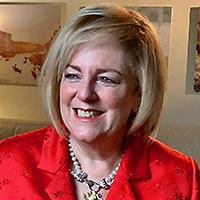
Member, Leadership Council, The Centre for Responsible Leadership
Cheryl Fishbein has a long history of voluntary leadership involvements. She is the President of the Jewish Community Relations Council of New York (JCRC). She is Past Chair of the Jewish Council for Public affairs (JCPA) and served on the Executive Council of the Conference of Presidents of Major Jewish Organizations. She is on the President’s Advisory Board of UJA-Federation of NY, is past chair of the Caring Commission, the Hurricane Katrina Relief Committee, the Missions Committee and the Trauma Task Force at UJA-Federation. She has served or is currently on the Boards of the Jewish Agency for Israel North America (JAFINA), JCC Association of North America, American Jewish Committee (AJC), Jewish Funders Network (JFN), World Jewish Congress North America Division (WJC), Israel Trauma Coalition, National Yiddish Theatre Folksbiene, JCC Krakow and the Jewish Federation of North America (JFNA), where she was chair of the International Emergency Relief Committee. She also chaired the Ambassadors Committee of the American Jewish Joint Distribution Committee (JDC), and is Chair of the Society Fellowship. She is Secretary of the Board of Israel 21c, and on the advisory boards of the Jan Karski Foundation and Jewish Home and Hospital. She is also past chair of the Domestic Council of the Washington, DC office of JFNA. Cheryl Serves on the International Board of Governors of ANU, Museum of the Jewish People, and is a past President of its American Friends. Cheryl is the past president and chair of the Edith and Carl Marks Jewish Community House of Bensonhurst in Brooklyn, and a past member of the Board of Governors of the Jewish Agency for Israel (JAFI).
Cheryl maintains a private practice as a clinical psychologist and an attorney. She has worked at the Federal Reserve Bank of New York and as a consultant to individuals looking to donate to charitable organizations. She holds a doctorate in Clinical Psychology from SUNY at Stony Brook, a law degree from New York University and a BA degree in psychology from Barnard College.
She is married to Philip Schatten and they have four children and seven grandchildren.
Ellen J. MacKenzie, PhD ’79, ScM ’75
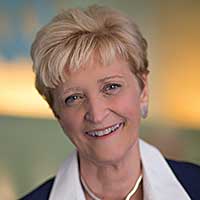
Ellen J. MacKenzie, PhD ’79, ScM ’75, is the 11th dean of the Johns Hopkins Bloomberg School of Public Health.
MacKenzie leads an organization that includes over 800 full-time faculty working in 60 countries and teaching more than 2,900 students from 87 nations. Under Dean MacKenzie’s leadership, the School seeks lifesaving solutions across a broad range of issues from chronic and infectious disease prevention to immunology, nutrition and child survival.
In 2018, MacKenzie led the creation of the Bloomberg School’s five-year strategic plan. The plan centers on five main themes—Education, Science, Partnerships, People and Advocacy—to focus energy and resources that aims to shape not just the School’s agenda but the future of public health.
Elected to the National Academy of Medicine in 2018, MacKenzie is an internationally recognized leader in public health, a renowned researcher on improving trauma care systems and policy, and a respected academic leader. An advocate for science, health equity and human rights, MacKenzie has spoken out forcefully against family separations at the U.S. border, gender-based discrimination and political interference in scientific research.
After earning graduate degrees from the Bloomberg School, MacKenzie joined the School’s Health Policy and Management (HPM) faculty in 1980, with a joint appointment in the Department of Biostatistics. A Bloomberg Distinguished Professor, she holds faculty appointments in the School of Medicine’s departments of Orthopaedic Surgery, Emergency Medicine and Physical Medicine and Rehabilitation.
MacKenzie founded and leads the Major Extremity Trauma Research Consortium, a collaboration of more than 50 U.S. trauma centers and military treatment facilities. A former director of the Johns Hopkins Center for Injury Research and Policy, she has shaped the field of trauma services and outcomes research, leading to improved quality of life for trauma survivors.
As a professor, department chair and senior associate dean for academic affairs at the Bloomberg School, MacKenzie has distinguished herself as an inspired leader. As HPM chair, MacKenzie enhanced practice as a part of the department’s mission, established a faculty development program that has served as a model for other departments and facilitated the development of a core curriculum in policy. She also helped establish the DrPH cohort programs in Taiwan, Abu Dhabi, the Pacific Rim, UAE and China.
MacKenzie’s vision for the Bloomberg School is shaped by her broad disciplinary background, commitment to fairness and equity for all, and substantive record of accomplishments across education, research, practice and administration.
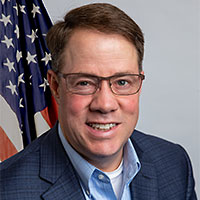
Tom Coderre
Mr. Tom Coderre is the Acting Deputy Assistant Secretary for Mental Health and Substance Use. With decades of public, private, and non-profit service, Mr. Coderre is the first person in recovery to lead SAMHSA. Mr. Coderre’s career has been significantly influenced by his personal journey and a philosophy that acknowledges the essential role peer recovery support services play in helping people with mental and substance use disorders rebuild their lives. In his role as SAMHSA’s Region 1 Administrator, Mr. Coderre led the prioritization of prevention, treatment and recovery services under the strain of COVID-19. He reconvened the Federal Interagency Workgroup on Opioids and as overdoses spiked throughout 2020, he brought the region together to identify programmatic and policy solutions to respond. He also formed a collaborative to unite federal agencies on serious mental illness and serious emotional disturbance to leverage partnerships to increase services and provide hope for people suffering. In an effort to address structural racism, Mr. Coderre launched the Diversity Inclusion Project Showcase to ensure equity in the distribution of resources across New England by introducing organizations who work in BIPOC communities to funders. He has supported federally recognized tribes and has been working with tribal leaders to open the first indigenous wellness center east of the Mississippi River.
While Chief of Staff to the Assistant Secretary for Mental Health and Substance Use and Senior Advisor to the Administrator, Mr. Coderre led the team that produced Facing Addiction in America: The Surgeon General’s Report on Alcohol, Drugs, and Health. He built strong relationships with Capitol Hill and the behavioral health stakeholder community and worked on the 21st Century Cures Act, which reauthorized SAMHSA, contained important mental health reform provisions, and included a $1 billion expansion for treatment to stem the opioid crisis and overdose epidemic. As a senior political appointee, he represented SAMHSA at the White House and other HHS offices and operating divisions. He took part in many cross-agency partnerships such as the Behavioral Health Coordinating Council and the Interagency Coordinating Committee for the Prevention of Underage Drinking. Mr. Coderre was also the Senior Advisor to the Director of the Center for Substance Abuse Treatment and the Federal Liaison to Unite to Face Addiction, the first rally for addiction treatment, recovery, and policy change, which attracted tens of thousands to the National Mall and joined together 650 partner organizations, a star-studded lineup of music performances and speeches from celebrities, policymakers, and healthcare experts.
As Senior Advisor to Rhode Island Governor Gina Raimondo, Mr. Coderre co-chaired a task force that coordinated a multi-layered strategy to address the opioid crisis. Under his guidance, the state built more treatment capacity, reduced prescribing, scaled prevention efforts, expanded resources for recovery support services as well as harm reduction programs, and broadened access to medication-assisted treatment and naloxone. He helped increase street-based outreach, community support, and linkages between critical services. Mr. Coderre worked on mental health policy and helped draft an Executive Order to improve access to treatment by enforcing parity laws. He served as acting Director of the Department of Behavioral Health, Developmental Disabilities and Hospitals. Mr. Coderre’s legacy includes establishing the Governor’s Recovery-Friendly Workplace Initiative to change workplace culture and encourage a healthy and safe environment where employers, employees, and communities can collaborate to create positive change and eliminate barriers for those impacted by addiction. He also worked with the State Police to establish the Hope Initiative, the first statewide program that engages law enforcement personnel in a proactive outreach strategy to combat the opioid overdose epidemic.
Mr. Coderre is the former National Field Director of Faces & Voices of Recovery and appeared in the documentary film The Anonymous People. He managed Recovery Voices Count, a non-partisan civic engagement campaign to mobilize the recovery community in 12 targeted states, and managed HBO’s Addiction education and outreach campaign, which included premieres in 30 major media markets, 500 house parties, 70 town hall meetings, and other public events. Mr. Coderre partnered with A&E Television on The Recovery Project where 5,000 people from the recovery community rallied and crossed the Brooklyn Bridge together in September 2008. He served as a member of the Rhode Island Senate from 1995 to 2003 and as Chief of Staff to the Senate President from 2009 to 2014. He has been recognized on numerous occasions for his dedication and advocacy efforts. Mr. Coderre is a graduate of both the Community College of Rhode Island and Rhode Island College.
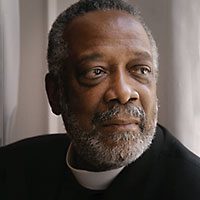
Rev. Edwin C. Sanders II
The Reverend Edwin C. Sanders, II, is the Senior Servant and Founder of Metropolitan Interdenominational Church (established 1981) in Nashville, Tennessee. This congregation attracts a broad cross-section of people with the mission of being “inclusive of all and alienating to none.” Metropolitan has outreach ministries in the areas of substance abuse, advocacy for children, sexual violence, and harm reduction, and since 1984 has provided services to persons infected with, and affected by, HIV/AIDS with the First Response Center being founded in 1992.
Rev. Sanders received the Bachelor of Arts degree in Anthropology from Wesleyan University in 1969. His professional life began as Co-Director of Wesleyan’s African American Institute. He later served on the Wesleyan University Board of Trustees; in 2014, received the Wesleyan University Distinguished Alumnus Award; and, in 2019, was awarded an Honorary Doctor of Humane Letters degree. He pursued graduate studies at Yale University and Vanderbilt University Divinity Schools.
In Nashville, Tennessee, Rev. Sanders has served as Pastoral Counselor for the Meharry Medical College Alcohol and Drug Abuse Program, Director of the Southern Prison Ministry, and Dean of the Chapel at Fisk University.
Rev. Sanders is an emeritus member of the Board of Directors of the Black AIDS Institute, a member of the Interdenominational Ministers’ Fellowship and the Ryan White Community AIDS Partnership, a life member of the NAACP, and served as a Commissioner for the Tennessee Human Rights Commission. Appointed to the CDC Advisory Committee on HIV and STD Prevention during the Clinton Administration, he served five years on the Presidential Advisory Council on HIV/AIDS during the Bush Administration. He also served as co-chair of the National Syphilis Elimination Working Group and was involved with the Obama Administration White House Office on AIDS in implementing the National AIDS Strategy. Rev. Sanders presented at the International AIDS Conferences in Switzerland, South Africa, Canada, Austria, the Netherlands and the United States, and at the AIDS Vaccine 2011 Conference in Thailand.
Rev. Sanders serves on the Boards of Directors of The National Minority AIDS Council, The Drug Policy Alliance, and Project Return addressing recidivism and mass incarceration. He is the National Coordinator of Religious Leaders for a More Just and Compassionate Drug Policy. He was the first Chair of the HIV Vaccine Trials Network (HVTN) Legacy Project Advisory Group which is designed to increase the participation of African Americans and Latinos in HIV vaccine studies and is presently an Ambassador for the HVTN. Currently he serves on the President’s Emergency Plan for AIDS Relief (PEPFAR) Scientific Advisory Board, Louisville Presbyterian Theological Seminary Board of Directors, and is Project Director for COVID-19 Prevention Network (CoVPN) Faith Community Engagement.
Dr. Susan Sherman
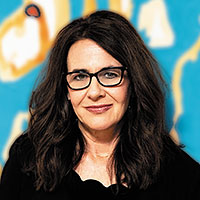
Dr. Susan Sherman is a Bloomberg American Professor of Health in the Department of Health, Behavior and Society at the Johns Hopkins Bloomberg School of Public Health. Dr. Sherman has joint appointments in the Departments of Population Family and Reproductive Health, Mental Health, Epidemiology, and Health, Policy, and Management. For over two decades, her research has focused on examining the structural drivers of and developing interventions to address health disparities among people who use drugs and women who sell sex in both domestic and global settings. She has examined specific environmental and structural drivers of HIV/STIs and overdose among women who sell sex in Baltimore. This body of research includes some of the first studies examining the impact of the occupational risk environment of exotic dance clubs on dancers and the role of the policing on the health of street-based sex workers. Dr. Sherman’s research has provided evidence for municipal and state policies on the expansion of harm reduction services, as well as sex work and drug decriminalization policies. She is currently evaluating the impact of decriminalizing low level drug offenses and sex work in Baltimore. She has authored more than 260 articles in peer reviewed journals and contributed to numerous policy related reports. She is the founder of the SPARC drop-in Center which provides low barrier medical, legal, harm reduction, mental health, and social services as well as comprehensive mobile outreach. Dr. Sherman has been a member of the Baltimore City Health Department’s syringe service advisory board since its formation and was an inaugural member of the Maryland’s Standing Advisory Committee on Opioid-Associated Disease Prevention and Outreach. She is Chair of the Board of the National Harm Reduction Coalition and a board member of her synagogue in Baltimore.
Chris Thrasher, M.A., CSC
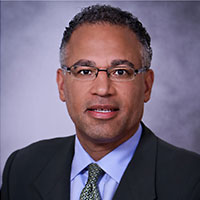
Managing Director of Substance Use Disorders and Recovery, Clinton Global Initiative
Christian serves as the Managing Director of Substance Use Disorders and Recovery within the Clinton Global Initiative (CGI) at the Clinton Foundation. In this capacity Chris oversees all of the foundation’s efforts helping to address the substance use disorders. Two of the cornerstone initiatives of this work at the foundation is working with communities and our foundation partners to ensure that Naloxone (the lifesaving opioid overdose reversal drug) is widely available, accessible and affordable. Another cornerstone initiative is CHMI’s Empowering Faith Leaders program. Our nations faith leaders are an integral part of stigma reduction regarding substance use disorders and as such CHMI is deeply engaged in the training of our current and future faith leaders throughout the United States.
Before joining the Clinton Foundation, Chris served as the Senior Vice President of Behavioral Health at Sharecare, a comprehensive health and wellness engagement platform. Prior to Sharecare, Chris served in several leadership roles over fourteen years in the Satcher Health Leadership Institute at Morehouse School of Medicine (MSM) in Atlanta, Georgia. In 2003, Chris founded and became director of the Center of Excellence for Sexual Health (CESH). In addition, Chris was a member of the faculty at MSM within the Department of Community Health and Preventive Medicine.
Since December 17th, 1989, Chris has been living in long-term recovery a day at a time.
